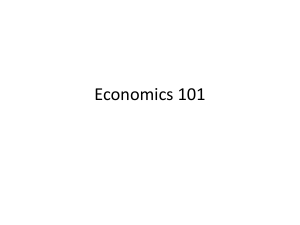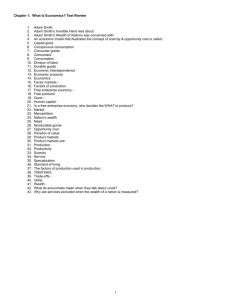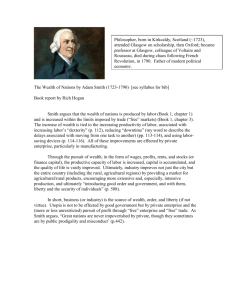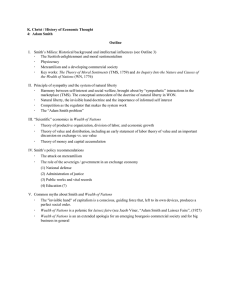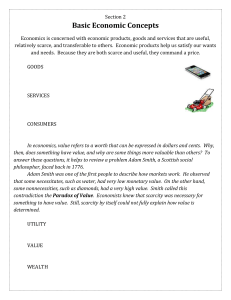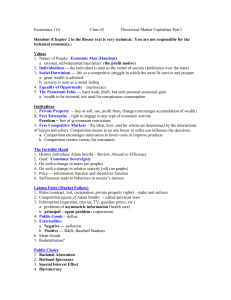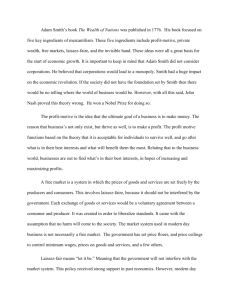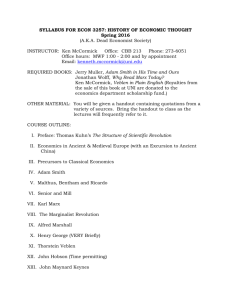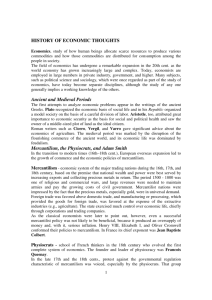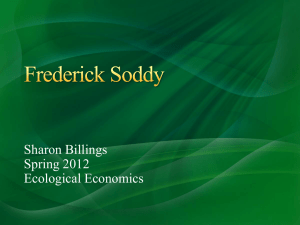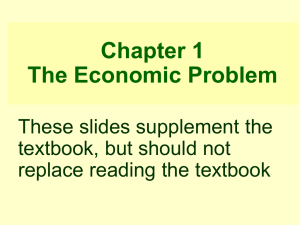Adam Smith
advertisement
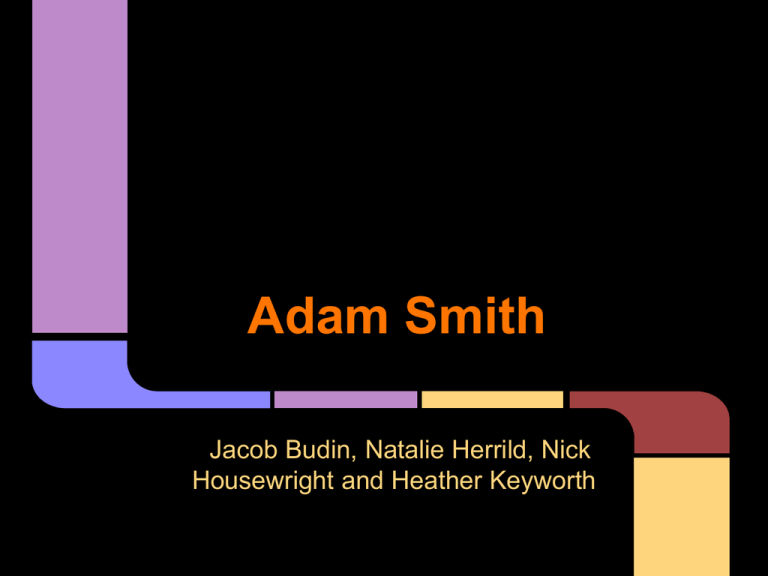
Adam Smith Jacob Budin, Natalie Herrild, Nick Housewright and Heather Keyworth Early Life • • • Exact DOB unknown; baptism recorded on 5 June 1723 in Kirkcaldy, Scotland Son of a lawyer/civil servant father and intellectual mother Ambitious childhood - attended one of the top secondary schools in nation Education • • • Enrolled at University of Glasgow at the age of 14 to study moral philosophy under Frances Hutcheson Transferred to Oxford, where he became unimpressed with professors' intellectual capabilties Later earned professorships at universities in Edinburgh and Glasgow Adult Life • • • 1759 - publishes The Theory of Moral Sentiments Spends time as tutor to children of politicians/noblemen 1766 - returns to Scotland to begin work on his magnus opus The Wealth of Nations -- published in 1776 World Ventures • • • • Geneva: philosophies of Voltaire Paris: intellects of Ben Franklin, Turgot, Jean D'Alembert University of Edinburgh: starts relationships of the enlightenment Glasgow University: head of Moral Philosophy Influences • • • • • - Rejected the Christian faith, supposedly dabbled in Deism "great phenomena of nature" - Henry Home and David Hume, Scottish philosophers and lawyers - Combated the French Philosophers (the enslavement of man v. the good in man) BIG ideas: killed Mercantilism • • • • • • • • • (1) The Benefits of Exchange (a) The Division of Labor (b) Exchange as Mutual Benefit (c) The Importance of Money. (2) The Labor Theory of Value Nominal Price/Value (measured in money) vs. Real Price/Value (measured in human labor). (3) "Invisible Hand" Explanations (a) of economic growth (wealth) (b) biological evolution; moral progress, the development of rights respecting republics, and of an international legal system that establishes perpetual peace THE WEALTH OF NATIONS • Main Idea: THE FREE MARKET (if you remember nothing remember this) • Five Books: (get ready for grotesque speed analysis) Book I: On the Causes of Improvement in the Productive Powers. On Labour, and on the Order According to Which its' Produce is Naturally Distributed Among the Different Ranks of the People. Division of Labor (Labour)/specialization is essential. Free Market is the best!/: Supply increase with demand/price increase with demand, etc. Monopolies are bad. Should be competition of labor, not just among producers/owners. Factionalists (Lobbyists/Special Interests) bad for economy (like monopolies they cause ‘unfair’ distortions in free market. Goods valued based on how much labor to make, and how much labor they can sell for…. so; total gain in opportunity cost essentially. Buuuuuut, we’ll probably talk about this in a bit… Book II: On the Nature, Accumulation, and Employment of Stock “Stock” (Capital) Necessary stock vs. Disposable (actual capital) Make money from: 1) Sell Goods 2) Rent Land 3) Accumulate Interest (plus anything not included in 1 & 2) Productive (add value to goods) vs. Unproductive (I guess you‘re just wasting time = money ) Interest: Used to for capital (start-up): Good (add value to economy) Used for Needs (buy food): Bad (probably won’t add value to economy ever… Book III: On the different Progress of Opulence in different Nations Trade off between the State (Federal Government), and cities and towns. SHOULD benefit both parties, okay? I mean… be a little loyal to the state guys, guys? Fall of Rome On Agriculture: was bad, turned out okay. On the rise of nations: Meh Book IV: On Systems of political Economy •Mercantilism is for Fools!!! (implied) Free-market > then state regulation • • • • The Invisible Hand of the Market! World domination of America Africa Asia... ...has worked out pretty well for Europe so far. Only French fools would believe an all-agriculture state could work, so lets not even waste time on those dandies! (insults mine) Book V: On the Revenue of the Sovereign or Commonwealth TAAAAAAAAAXXXXXXEEEEESSSS!!!!!!!!! TAXES •Proportionality •Transparency •Convenience •Efficiency Actually, we didn’t talkpay about a progressive … Progressive Tax… what society has tax… you to earn allowed Government shouldn’t be allowed to borrow indefinitely. (America) Legacy • • Seen by many as the founder of a moral philosophy and the science of economics Wrote of "homo economicus" or economic man o Assumed all economic men were rational. Contributions to Economics • Division of Labor o o • o Divided tasks Made production more efficient Firms became more productive Accumulation of Stock o Person was able to hire someone else to help complete a task Contributions to Economics • Self-Interest o We are all motivated by nothing other than our own self-interest Contributions to Economics • Supply and Demand Built a coherent and logical theory of how the economy works by stating law of supply and demand o Most vital contribution to econ o As the price of a good rises, the supply will increase o Producers will manufacture more of the product o Testimonials • Margaret Thatcher o • Carried a copy of "The Wealth of Nations" in her handbag at all times George Stigler o o "The most important substantive proposition in all of economic." Under competition, owners of resources will use themmost profitably, resulting in an equal rate of return in equilibrium for all users. Conclusion • • • One of the Fathers of Mondern Economic Thought "Wealth of Nations" o Key Work in Economics Concepts o Free market o Division of Labor Questions? Sources S http://en.wikipedia.org/wiki/Adam_smith http://www.lucidcafe.com/library/96jun/smith.html http://en.wikipedia.org/wiki/Voltaire http://en.wikipedia.org/wiki/Scottish_Enlightenment http://www.economist.com/node/16740415 http://www.victorianweb.org/economics/smith.html http://www.bartleby.com/60/193.html And of course “Wealth of Nations” by Adam Smith
